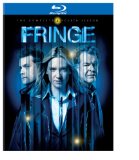| Reviews & Columns |
|
Reviews DVD TV on DVD Blu-ray 4K UHD International DVDs In Theaters Reviews by Studio Video Games Features Collector Series DVDs Easter Egg Database Interviews DVD Talk Radio Feature Articles Columns Anime Talk DVD Savant Horror DVDs The M.O.D. Squad Art House HD Talk Silent DVD
|
DVD Talk Forum |
|
|
| Resources |
|
DVD Price Search Customer Service #'s RCE Info Links |
|
Columns
|
|
|
Fringe: The Complete Fourth Season
Warner Bros. // Unrated // September 4, 2012
List Price: $69.97 [Buy now and save at Amazon]
The Film:
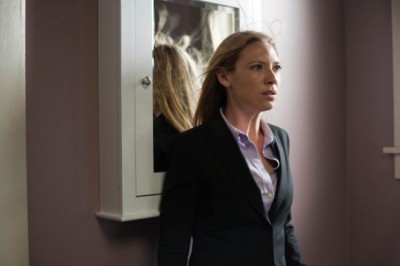 ... and then, the Fringe universe went "out there". And I'm mostly alright with that.
... and then, the Fringe universe went "out there". And I'm mostly alright with that.
Well, between shapeshifters, interacting alternate realities, and time-traveling observers who oversee the course of history, things were already out in the stratosphere. That's one of Fringe's distinguishing and most endearing traits, though: somehow, learning from the mistakes made with LOST's obscured universe and unintentional red herrings, the creative team under J.H. Wyman and Jeff Pinkner built convincing, thrilling answers to the wild influx of science-fiction pandemonium pulsing through its veins. Some of it flirts with reputable fringe science and some of it topples into the realm of total capriciousness, both in the case-by-case anomalies and the overarching story of conflicting universes, but it always abides by its own relative rules of causality as the mysteries layer atop one another. So, how does Fringe handle the tampering of reality's fabric -- and the existence of a key person -- as it descend into the truly improbable, in a narrative so deeply entrenched in its own lore that it leaves newcomers downright lost? With praiseworthy enthusiasm, even as the clever writing becomes a tad too dubious and jumbled for its own good.
Some writers might feel obligated to pad out the mind-boggling ending of the third season (review here), where one of its crucial characters, Peter Bishop (Joshua Jackson), vanishes from reality as a temporal anomaly never meant to exist. That uncertainty after Peter uses the "doomsday device" leaves everything known about both realities completely up in the air, with a new set of rules about what his absence really means. Not Fringe. It understands the chaos, yet instead of giving the audience some form of make-me-understand anchor, they're content in letting the viewers flounder in this new-fangled ambiguity: the premiere episode continues on as if the events that transpired are now simply the way things are, driven by a conversation and an exchange of info between both version of Olivia Dunham (Anna Torv) in the "bridge" that now exists between the two realities. Heaps of confidence is required to immerse an audience in new circumstances without fully explaining the tether, and the writing here possesses that. Toss in a brief conversation with the Observers, and we're on the way to understanding -- or at least trying to understand -- what's going on in this "amber" universe.
But, as one might expect, clever ole' Fringe won't just come out and explain what's happened. Instead, the writers abide by one of the oldest rules of storytelling: they show instead of tell, revealing how the characters differ by letting their weatherworn audience, completely aware of their favorite characters' mannerisms, ascertain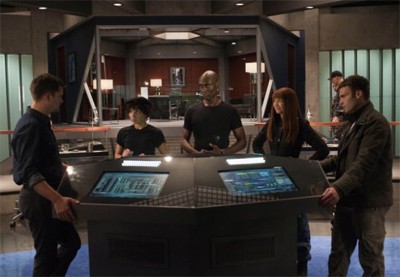 the differences. Olivia has become stern-faced and somewhat cold in a world where she's never met Peter, while Walter Bishop (John Noble) -- having never saved his son's life -- is a bitter and less-flippant version of himself, possessing a different kind of brilliance, psychosis, and overall demeanor. The infrastructure of that universe's Fringe Division has largely stayed intact, only with missing pieces where Peter's involvement should be; yet that slight difference, even if it hasn't changed the overall outcome, has led to a different slate of cases, memories, and impactful events. What bolster our curiosity of this new universe's validity are the recurring flashes of Peter that force Walter's wavering sanity over the edge, and whether he's alone in seeing the man that was never there.
the differences. Olivia has become stern-faced and somewhat cold in a world where she's never met Peter, while Walter Bishop (John Noble) -- having never saved his son's life -- is a bitter and less-flippant version of himself, possessing a different kind of brilliance, psychosis, and overall demeanor. The infrastructure of that universe's Fringe Division has largely stayed intact, only with missing pieces where Peter's involvement should be; yet that slight difference, even if it hasn't changed the overall outcome, has led to a different slate of cases, memories, and impactful events. What bolster our curiosity of this new universe's validity are the recurring flashes of Peter that force Walter's wavering sanity over the edge, and whether he's alone in seeing the man that was never there.
I know, I know: another reality, right? It's been hard enough to keep tabs on exactly what's happened and who did what in Fringe's dual universes, and now they've gone and morphed everything we thought we knew about 'em. This time, however, the shift affords the show a fresh perspective and a chance to change anything they desire -- a darker path. Olivia, having never built her relationship with Peter after the events that brought her to Fringe Division in the first place, becomes emotionally closed-off and fairly cold, to which Anna Torv convincingly creates yet another iteration of the character. While it's disheartening (at first) to see Olivia's emotional progression clam up, the shift creates an intriguing dynamic for the audience to pinpoint exactly how she's the same and how she's different. Walter, however, benefits even more, as this dark psychological path bridles the whimsical, food-obsessed, inane properties that had become hyperbolized in his character. Here, he's legitimately disturbed and haunted by the transgressions of his past, a comfortable zone for Noble's innate theatricality. Don't worry, though: he'll eventually find his way back to something resembling the old Walter, with a little time.
Typically, I avoid revealing as many plot details as possible, but there's a topic -- a massive elephant in the room -- which cannot really be avoided. Presented with a fork in the road, the show could've traveled down two paths in regards to Peter's fate: one is a bleak, hard-edged choice that could intelligently reap the repercussions it sewed with his predestination and erasure from existence, and the other revolves around pure contentment value that,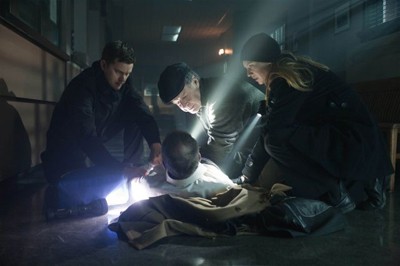 essentially, would negate what's happened and reinstate one of the show's cornerstone characters. Fringe, ever ambitious, attempts to have its cake and eat it, too; yes, Peter returns, and yes, the reason it occurs becomes incredibly far-fetched, but the harebrained improbability of his presence gradually surrenders to the impact he imposes on this new-fangled, unaware version of his reality. Calm, calculated, and attuned to why everyone's uncomfortable, Peter presents an unsettling paradox for both Walter and Olivia, where he attempts to assimilate in a world, amongst loved ones and family, that never knew he existed. Fringe doesn't merely sweep his reemergence under the rug, even if the anomaly smacks of a forcible return to square one.
essentially, would negate what's happened and reinstate one of the show's cornerstone characters. Fringe, ever ambitious, attempts to have its cake and eat it, too; yes, Peter returns, and yes, the reason it occurs becomes incredibly far-fetched, but the harebrained improbability of his presence gradually surrenders to the impact he imposes on this new-fangled, unaware version of his reality. Calm, calculated, and attuned to why everyone's uncomfortable, Peter presents an unsettling paradox for both Walter and Olivia, where he attempts to assimilate in a world, amongst loved ones and family, that never knew he existed. Fringe doesn't merely sweep his reemergence under the rug, even if the anomaly smacks of a forcible return to square one.
Despite that, Fringe continues head-on with its picaresque case-by-case structure in the new reality, showing at first how the universe operates without Peter around as a dramatic lead-in. Courting a prospective partner in Agent Lincoln Lee (Seth Gabel) -- this universe's spectacle-adorned, reserved version of a self-assured agent in the alternate universe -- Olivia navigates crime scenes with a wired-up Astrid (Jasika Nicole) as Walter's eyes and ears, solving a slate of outlandish cases that tie to this season's central themes: Walter employs the extent of his knowledge and emotion to help a young boy with a physiological attachment to a violent fungus; Olivia employs a forensic psychologist to profile his violent alternate-universe doppelganger, himself a serial killer; and a young artist foresees the deaths of others and warns them through sketches, though she's unable to change their outcome. Here, the writers want to punctuate choice, fate, and the series' new perspectives on emotional turmoil in the new versions of its characters -- and it works, on a visceral level, though the thematic correlations are convenient and heavy-handed. To some extent, though, these are more intriguing cases than last season's mish-mash of implausibility, even if it's clear by the repetition of prophetic and invisibility concepts that they're running on creative fumes.
Thankfully, the writers seem to realize this, because the majority of this season instead tracks the resurgence of the shape-shifters in this altered timeline, and how it mettles with the relationship between "here" and "there". While the Fringe Division provides a great backbone for the story to operate on, the mystery lying underneath those fringe events -- the cause, the culprit, and what's going on while the team solves these crimes -- drives the show's true intrigue, this time around high-level espionage and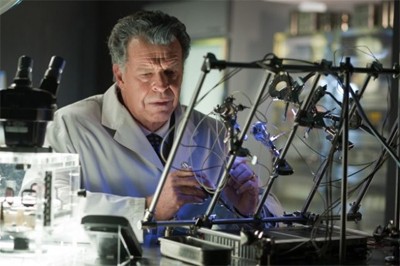 infiltration with a sinister purpose. Fringe doesn't shy away from exploiting the potential behind shape-shifters and alternate universes in such a temporally fragmented narrative: faces who seem trustworthy are now under suspicion of being replications, while villains once dead in other splinters of reality can be resurrected. Creating a frantic sense of anticipation behind this season, this allows Fringe to coil around its audience with deception and misguided presumptions about who's to be trusted and not, overcoming any mild frustration with the theorizing it encourages towards motives and causal outcomes.
infiltration with a sinister purpose. Fringe doesn't shy away from exploiting the potential behind shape-shifters and alternate universes in such a temporally fragmented narrative: faces who seem trustworthy are now under suspicion of being replications, while villains once dead in other splinters of reality can be resurrected. Creating a frantic sense of anticipation behind this season, this allows Fringe to coil around its audience with deception and misguided presumptions about who's to be trusted and not, overcoming any mild frustration with the theorizing it encourages towards motives and causal outcomes.
Everything about this season feels like it's spiraling wildly out of control, in a good way, progressing towards an enormous stage of events that's unable to be restrained by the actions of fringe scientists, the Observers ... even the grand design of the universe itself, it seems. It's a wild, partly disjointed but entirely absorbing ride, driven by concepts of converging realities and butterfly effects that unravel answers to the show's quandaries: Peter's true place among the realities, the extent of Olivia's potential as a Cortexiphan patient, and where this new non-Peter reality factors in the existence among the others. None of the speculations are as profound as those sparked by the mind-numbing variable(s) created in "Letters of Transit", the off-the-wall installment of this season, which presents a vision of the future roughly twenty to twenty-five years ahead of the current time placement. Focused on fascistic Observers and rebelling citizens in a dystopian New York, this fantastic episode -- featuring Henry Ian Cusick as a weathered rebel and 'Etta, a beguiling and hardnosed woman with familiarly straight blonde hair -- offers a dark glimpse into a potential future for one universe, though it's uncertain which one.
"Letters of Transit" creates a sense of anxiety over what's to come, whether it's an applicable portrait of the projected future or merely a curio peek at one of many outcomes. This instability starts a domino effect that continues through this season's climax, which, in the two-part "Brave New World" finale, wraps up many of the series' details into a decadent, crowd-pleasing bow -- and, though frantically written around a few niggling contrivances, it could've worked really well as a breathless series finale. In my review of Fringe's third season, it was suggested that the writers might want to consider mapping out a finite destination for the series, especially considering the wavering ratings this "best show no-one's watching" has garnered. But, this isn't exactly it; we're approaching one last (half-)season to wrap up the loose ends that Fringe left up to interpretation, and it could prove really fascinating considering the framework they've constructed. Will Fringe Division prevent that future, or will they fight within it as the unavoidable outcome of all events? Those are the answers one has to look forward to as the bookend of Fox's enduring science-fiction marvel, and they're worth exploring.
Check Out DVDTalk's Other Fringe Reviews: Season One (DVD) | Season Two (DVD) | Season Three
The Blu-ray:
Springboarding off the successful technological advancements from last season, Fringe: The Complete Fourth Season arrives from Warner Brothers in a four-disc slimline Blu-ray case with design accouterments that mirror those of the previous offerings. A nice foldout Episode Guide offers brief descriptions of the season's installments (as well as whether they take place in the prime or alternate universes, or both), with a range of the show's clever promotional images adorning it. A semi-shiny cardboard slipcover replicates the top artwork, yet unlike other releases there's no unique cast artwork on the back. And yes, just like the previous season, this one comes armed with the "marathon viewing" mechanism that allows the viewer, when prompted at the end of the slate of episodes, to eject the disc and continue playing the content straight through on the next disc. I love that.
Video and Audio:
I believe this is the best Fringe has looked on Blu-ray. Largely, it appears extremely similar to the third season: each 1.78:1 1080p AVC encode features a strong showing in skin tone retention, blasts of robust color that venture all across a brightly-hued spectrum, and fine detail in close-up and garments. The still camera shots in Walter's laboratory aren't home to as many lavish eye-popping colors as normal, since it's a darker and more craggy environment, but outside shots with neon lights, orange flood lamps hitting the pavement, and computerized components in the alternate universe pick up the slack from a photography standpoint. The improvements hinge on contrast balance and a more apt eye for even finer details, less smoothed-over and controlled than they've appeared before. And considering that three of the discs present six forty-five minute episodes, totaling roughly four hours (!) on each one, they're all exceptionally well-presented. Not perfect -- some textures smooth out and a few heavy-contrast sequences grow heavy -- but brilliant under the circumstances and extremely indicative of the broadcast intentions.
One might take the 5-channel DTS-HD Master Audio tracks for granted, given the fact that most releases come armed with those high-definition sound presentations. But that's an arena where Fringe fans went dissatisfied for a few seasons: the first two slates of episodes came only with semi-strong Dolby Digital 5.1 presentations. The advancement remains appreciated here: while several of the episodes aren't terribly heavy with rear-channel activity (though they'll surprise you a few times, from a electromagnetic surge to standard action-show activity), you'll hear a lot of aggressive sounds from the front-end: fluids rushing, flesh searing, energy radiating, screens crashing, doors opening and closing, and others. The driving forces here, of course, are the suspenseful pulse-heavy music and the often abrasive dialogue, all of which ensnare the audience with awareness of environment and ambiance. Some lines of dialogue sound muffled on occasion and a few louder sound elements put on the brakes before delivering the extent of their power, but we're working with a great collection of enveloping tracks here. Subtitles are available in English, French and Spanish.
Special Features:
As the seasons of Fringe continue, the number of bonus features accompanying the Blu-ray/DVD releases dwindle further and further, unfortunately. While the third season chopped the number of commentaries down to only two, that's a welcome number compared to the number available here: ZERO, no commentaries to be found. On top of that, there also aren't any episode-accompanying features to be found, either. I suppose you could consider the idea that the discussion topics might grow redundant, but there are more than a few intriguing production and digital effects elements that merit discussion.
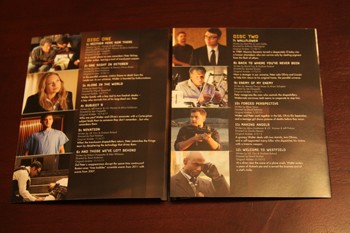 What we do get, on the other hand, is roughly an hour of bonus features that vary in weight. The most substantial one would be The Culture of Fringe (29:42, HD), a round-table discussion with actor John Noble, J.H. Wyman, and Jeff Pinkner on the Fringe front, as well as USC physics/astronomy professor Nicolas Warner and USC philosophy/ethics professor Dr. Shlomo Sher. They discuss the dimensional attitude of the various versions of Walter Bishop as a scientist and boundary-pusher, the state of synthetic augmentation on a person and how they tie to the Fringe universe and ethics, and a bit on trans-humanism and "The Transcendent Man". It's an interesting discussion, one that's not stuffy or pretentious in the slightest as they toss a few surface-level ideas about the philosophy and implications of what's going on -- both in the show, and how real life impact it.
What we do get, on the other hand, is roughly an hour of bonus features that vary in weight. The most substantial one would be The Culture of Fringe (29:42, HD), a round-table discussion with actor John Noble, J.H. Wyman, and Jeff Pinkner on the Fringe front, as well as USC physics/astronomy professor Nicolas Warner and USC philosophy/ethics professor Dr. Shlomo Sher. They discuss the dimensional attitude of the various versions of Walter Bishop as a scientist and boundary-pusher, the state of synthetic augmentation on a person and how they tie to the Fringe universe and ethics, and a bit on trans-humanism and "The Transcendent Man". It's an interesting discussion, one that's not stuffy or pretentious in the slightest as they toss a few surface-level ideas about the philosophy and implications of what's going on -- both in the show, and how real life impact it.
From there, the rest of the special features take a more surface-level glimpse at supplemental content, though a few are worthwhile. The Observers (11:48, HD) being one of them: this brief but slick featurette features interviews with Wyman, Pinkner, and September's actor Michael Cerveris as they explore the mythology of the enigmatic beings, which includes behind-the-scenes shots of Cerveris getting geared up for his screen time and how his character derived some inspiration from his dog, Gibson. The other piece worth checking out is A World Without Peter (12:25, HD), which point-blank expresses that they designed this season, and this new universe, with the idea that it might be the show's last. It's not very much more than an EPK exploration of the season, though it hones in on how Peter's absence plays into the show's changed shape, but the interviews and behind-the-scenes shots -- and the discussion about the beautiful Astrid episode -- make it worth the time.
There's also a comic book Excerpt from Beyond the Fringe and a Beyond the Comic Book (3:34, HD)featurette on making Joshua Jackson's idea for the story: what happens to Peter Bishop after "the device". Also, there's a Have You Seen Walter Lately? (2:11. HD) piece that collects fun moments with the character, and a Gag Reel (2:11, HD).
Final Thoughts:
The quality of Fringe's fourth season advances and retracts in equal strides, but it's still the same high-caliber, exciting piece of science-fiction television that has persevered in the face of time-slot shifts and ratings fluctuations. There's a reason it presses forward: the narrative, though impossible to pick up on for newcomers at this point, contains an elaborately-layered, interconnected network of mythology that grows richer with every episode of this season, cutting through the red tape of implausibility built around the third season's conclusion with vivacity and a knack for really interesting exposition. Another pair of realities built around the non-existence of Peter? Sure. Addressing how Peter could return? Why not. Projecting what could happen after all's said and done with this time-period's Fringe Division? Mercy, yes. Compelling performances, an energetic aesthetic style, crafty-as-hell writing and a perverse exploration of ethical and scientific quandaries keep the Fringe addiction rolling.
It's a bummer that WB has been pulling back on the special features for the show's releases, but the audiovisual properties are the best yet for this slate of episodes. And we go get a handful of decent featurettes, including a semi-insightful glimpse at what the creators have to say about the show's ethics and science in the face of quasi-authorities. Highly Recommended.
Thomas Spurlin, Staff Reviewer -- DVDTalk Reviews | Personal Blog/Site
 ... and then, the Fringe universe went "out there". And I'm mostly alright with that.
... and then, the Fringe universe went "out there". And I'm mostly alright with that. Well, between shapeshifters, interacting alternate realities, and time-traveling observers who oversee the course of history, things were already out in the stratosphere. That's one of Fringe's distinguishing and most endearing traits, though: somehow, learning from the mistakes made with LOST's obscured universe and unintentional red herrings, the creative team under J.H. Wyman and Jeff Pinkner built convincing, thrilling answers to the wild influx of science-fiction pandemonium pulsing through its veins. Some of it flirts with reputable fringe science and some of it topples into the realm of total capriciousness, both in the case-by-case anomalies and the overarching story of conflicting universes, but it always abides by its own relative rules of causality as the mysteries layer atop one another. So, how does Fringe handle the tampering of reality's fabric -- and the existence of a key person -- as it descend into the truly improbable, in a narrative so deeply entrenched in its own lore that it leaves newcomers downright lost? With praiseworthy enthusiasm, even as the clever writing becomes a tad too dubious and jumbled for its own good.
Some writers might feel obligated to pad out the mind-boggling ending of the third season (review here), where one of its crucial characters, Peter Bishop (Joshua Jackson), vanishes from reality as a temporal anomaly never meant to exist. That uncertainty after Peter uses the "doomsday device" leaves everything known about both realities completely up in the air, with a new set of rules about what his absence really means. Not Fringe. It understands the chaos, yet instead of giving the audience some form of make-me-understand anchor, they're content in letting the viewers flounder in this new-fangled ambiguity: the premiere episode continues on as if the events that transpired are now simply the way things are, driven by a conversation and an exchange of info between both version of Olivia Dunham (Anna Torv) in the "bridge" that now exists between the two realities. Heaps of confidence is required to immerse an audience in new circumstances without fully explaining the tether, and the writing here possesses that. Toss in a brief conversation with the Observers, and we're on the way to understanding -- or at least trying to understand -- what's going on in this "amber" universe.
But, as one might expect, clever ole' Fringe won't just come out and explain what's happened. Instead, the writers abide by one of the oldest rules of storytelling: they show instead of tell, revealing how the characters differ by letting their weatherworn audience, completely aware of their favorite characters' mannerisms, ascertain
 the differences. Olivia has become stern-faced and somewhat cold in a world where she's never met Peter, while Walter Bishop (John Noble) -- having never saved his son's life -- is a bitter and less-flippant version of himself, possessing a different kind of brilliance, psychosis, and overall demeanor. The infrastructure of that universe's Fringe Division has largely stayed intact, only with missing pieces where Peter's involvement should be; yet that slight difference, even if it hasn't changed the overall outcome, has led to a different slate of cases, memories, and impactful events. What bolster our curiosity of this new universe's validity are the recurring flashes of Peter that force Walter's wavering sanity over the edge, and whether he's alone in seeing the man that was never there.
the differences. Olivia has become stern-faced and somewhat cold in a world where she's never met Peter, while Walter Bishop (John Noble) -- having never saved his son's life -- is a bitter and less-flippant version of himself, possessing a different kind of brilliance, psychosis, and overall demeanor. The infrastructure of that universe's Fringe Division has largely stayed intact, only with missing pieces where Peter's involvement should be; yet that slight difference, even if it hasn't changed the overall outcome, has led to a different slate of cases, memories, and impactful events. What bolster our curiosity of this new universe's validity are the recurring flashes of Peter that force Walter's wavering sanity over the edge, and whether he's alone in seeing the man that was never there. I know, I know: another reality, right? It's been hard enough to keep tabs on exactly what's happened and who did what in Fringe's dual universes, and now they've gone and morphed everything we thought we knew about 'em. This time, however, the shift affords the show a fresh perspective and a chance to change anything they desire -- a darker path. Olivia, having never built her relationship with Peter after the events that brought her to Fringe Division in the first place, becomes emotionally closed-off and fairly cold, to which Anna Torv convincingly creates yet another iteration of the character. While it's disheartening (at first) to see Olivia's emotional progression clam up, the shift creates an intriguing dynamic for the audience to pinpoint exactly how she's the same and how she's different. Walter, however, benefits even more, as this dark psychological path bridles the whimsical, food-obsessed, inane properties that had become hyperbolized in his character. Here, he's legitimately disturbed and haunted by the transgressions of his past, a comfortable zone for Noble's innate theatricality. Don't worry, though: he'll eventually find his way back to something resembling the old Walter, with a little time.
Typically, I avoid revealing as many plot details as possible, but there's a topic -- a massive elephant in the room -- which cannot really be avoided. Presented with a fork in the road, the show could've traveled down two paths in regards to Peter's fate: one is a bleak, hard-edged choice that could intelligently reap the repercussions it sewed with his predestination and erasure from existence, and the other revolves around pure contentment value that,
 essentially, would negate what's happened and reinstate one of the show's cornerstone characters. Fringe, ever ambitious, attempts to have its cake and eat it, too; yes, Peter returns, and yes, the reason it occurs becomes incredibly far-fetched, but the harebrained improbability of his presence gradually surrenders to the impact he imposes on this new-fangled, unaware version of his reality. Calm, calculated, and attuned to why everyone's uncomfortable, Peter presents an unsettling paradox for both Walter and Olivia, where he attempts to assimilate in a world, amongst loved ones and family, that never knew he existed. Fringe doesn't merely sweep his reemergence under the rug, even if the anomaly smacks of a forcible return to square one.
essentially, would negate what's happened and reinstate one of the show's cornerstone characters. Fringe, ever ambitious, attempts to have its cake and eat it, too; yes, Peter returns, and yes, the reason it occurs becomes incredibly far-fetched, but the harebrained improbability of his presence gradually surrenders to the impact he imposes on this new-fangled, unaware version of his reality. Calm, calculated, and attuned to why everyone's uncomfortable, Peter presents an unsettling paradox for both Walter and Olivia, where he attempts to assimilate in a world, amongst loved ones and family, that never knew he existed. Fringe doesn't merely sweep his reemergence under the rug, even if the anomaly smacks of a forcible return to square one. Despite that, Fringe continues head-on with its picaresque case-by-case structure in the new reality, showing at first how the universe operates without Peter around as a dramatic lead-in. Courting a prospective partner in Agent Lincoln Lee (Seth Gabel) -- this universe's spectacle-adorned, reserved version of a self-assured agent in the alternate universe -- Olivia navigates crime scenes with a wired-up Astrid (Jasika Nicole) as Walter's eyes and ears, solving a slate of outlandish cases that tie to this season's central themes: Walter employs the extent of his knowledge and emotion to help a young boy with a physiological attachment to a violent fungus; Olivia employs a forensic psychologist to profile his violent alternate-universe doppelganger, himself a serial killer; and a young artist foresees the deaths of others and warns them through sketches, though she's unable to change their outcome. Here, the writers want to punctuate choice, fate, and the series' new perspectives on emotional turmoil in the new versions of its characters -- and it works, on a visceral level, though the thematic correlations are convenient and heavy-handed. To some extent, though, these are more intriguing cases than last season's mish-mash of implausibility, even if it's clear by the repetition of prophetic and invisibility concepts that they're running on creative fumes.
Thankfully, the writers seem to realize this, because the majority of this season instead tracks the resurgence of the shape-shifters in this altered timeline, and how it mettles with the relationship between "here" and "there". While the Fringe Division provides a great backbone for the story to operate on, the mystery lying underneath those fringe events -- the cause, the culprit, and what's going on while the team solves these crimes -- drives the show's true intrigue, this time around high-level espionage and
 infiltration with a sinister purpose. Fringe doesn't shy away from exploiting the potential behind shape-shifters and alternate universes in such a temporally fragmented narrative: faces who seem trustworthy are now under suspicion of being replications, while villains once dead in other splinters of reality can be resurrected. Creating a frantic sense of anticipation behind this season, this allows Fringe to coil around its audience with deception and misguided presumptions about who's to be trusted and not, overcoming any mild frustration with the theorizing it encourages towards motives and causal outcomes.
infiltration with a sinister purpose. Fringe doesn't shy away from exploiting the potential behind shape-shifters and alternate universes in such a temporally fragmented narrative: faces who seem trustworthy are now under suspicion of being replications, while villains once dead in other splinters of reality can be resurrected. Creating a frantic sense of anticipation behind this season, this allows Fringe to coil around its audience with deception and misguided presumptions about who's to be trusted and not, overcoming any mild frustration with the theorizing it encourages towards motives and causal outcomes. Everything about this season feels like it's spiraling wildly out of control, in a good way, progressing towards an enormous stage of events that's unable to be restrained by the actions of fringe scientists, the Observers ... even the grand design of the universe itself, it seems. It's a wild, partly disjointed but entirely absorbing ride, driven by concepts of converging realities and butterfly effects that unravel answers to the show's quandaries: Peter's true place among the realities, the extent of Olivia's potential as a Cortexiphan patient, and where this new non-Peter reality factors in the existence among the others. None of the speculations are as profound as those sparked by the mind-numbing variable(s) created in "Letters of Transit", the off-the-wall installment of this season, which presents a vision of the future roughly twenty to twenty-five years ahead of the current time placement. Focused on fascistic Observers and rebelling citizens in a dystopian New York, this fantastic episode -- featuring Henry Ian Cusick as a weathered rebel and 'Etta, a beguiling and hardnosed woman with familiarly straight blonde hair -- offers a dark glimpse into a potential future for one universe, though it's uncertain which one.
"Letters of Transit" creates a sense of anxiety over what's to come, whether it's an applicable portrait of the projected future or merely a curio peek at one of many outcomes. This instability starts a domino effect that continues through this season's climax, which, in the two-part "Brave New World" finale, wraps up many of the series' details into a decadent, crowd-pleasing bow -- and, though frantically written around a few niggling contrivances, it could've worked really well as a breathless series finale. In my review of Fringe's third season, it was suggested that the writers might want to consider mapping out a finite destination for the series, especially considering the wavering ratings this "best show no-one's watching" has garnered. But, this isn't exactly it; we're approaching one last (half-)season to wrap up the loose ends that Fringe left up to interpretation, and it could prove really fascinating considering the framework they've constructed. Will Fringe Division prevent that future, or will they fight within it as the unavoidable outcome of all events? Those are the answers one has to look forward to as the bookend of Fox's enduring science-fiction marvel, and they're worth exploring.
The Blu-ray:
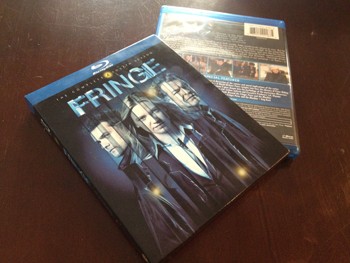 | 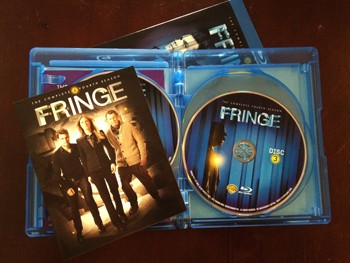 |
Springboarding off the successful technological advancements from last season, Fringe: The Complete Fourth Season arrives from Warner Brothers in a four-disc slimline Blu-ray case with design accouterments that mirror those of the previous offerings. A nice foldout Episode Guide offers brief descriptions of the season's installments (as well as whether they take place in the prime or alternate universes, or both), with a range of the show's clever promotional images adorning it. A semi-shiny cardboard slipcover replicates the top artwork, yet unlike other releases there's no unique cast artwork on the back. And yes, just like the previous season, this one comes armed with the "marathon viewing" mechanism that allows the viewer, when prompted at the end of the slate of episodes, to eject the disc and continue playing the content straight through on the next disc. I love that.
Video and Audio:
I believe this is the best Fringe has looked on Blu-ray. Largely, it appears extremely similar to the third season: each 1.78:1 1080p AVC encode features a strong showing in skin tone retention, blasts of robust color that venture all across a brightly-hued spectrum, and fine detail in close-up and garments. The still camera shots in Walter's laboratory aren't home to as many lavish eye-popping colors as normal, since it's a darker and more craggy environment, but outside shots with neon lights, orange flood lamps hitting the pavement, and computerized components in the alternate universe pick up the slack from a photography standpoint. The improvements hinge on contrast balance and a more apt eye for even finer details, less smoothed-over and controlled than they've appeared before. And considering that three of the discs present six forty-five minute episodes, totaling roughly four hours (!) on each one, they're all exceptionally well-presented. Not perfect -- some textures smooth out and a few heavy-contrast sequences grow heavy -- but brilliant under the circumstances and extremely indicative of the broadcast intentions.
One might take the 5-channel DTS-HD Master Audio tracks for granted, given the fact that most releases come armed with those high-definition sound presentations. But that's an arena where Fringe fans went dissatisfied for a few seasons: the first two slates of episodes came only with semi-strong Dolby Digital 5.1 presentations. The advancement remains appreciated here: while several of the episodes aren't terribly heavy with rear-channel activity (though they'll surprise you a few times, from a electromagnetic surge to standard action-show activity), you'll hear a lot of aggressive sounds from the front-end: fluids rushing, flesh searing, energy radiating, screens crashing, doors opening and closing, and others. The driving forces here, of course, are the suspenseful pulse-heavy music and the often abrasive dialogue, all of which ensnare the audience with awareness of environment and ambiance. Some lines of dialogue sound muffled on occasion and a few louder sound elements put on the brakes before delivering the extent of their power, but we're working with a great collection of enveloping tracks here. Subtitles are available in English, French and Spanish.
Special Features:
As the seasons of Fringe continue, the number of bonus features accompanying the Blu-ray/DVD releases dwindle further and further, unfortunately. While the third season chopped the number of commentaries down to only two, that's a welcome number compared to the number available here: ZERO, no commentaries to be found. On top of that, there also aren't any episode-accompanying features to be found, either. I suppose you could consider the idea that the discussion topics might grow redundant, but there are more than a few intriguing production and digital effects elements that merit discussion.
 What we do get, on the other hand, is roughly an hour of bonus features that vary in weight. The most substantial one would be The Culture of Fringe (29:42, HD), a round-table discussion with actor John Noble, J.H. Wyman, and Jeff Pinkner on the Fringe front, as well as USC physics/astronomy professor Nicolas Warner and USC philosophy/ethics professor Dr. Shlomo Sher. They discuss the dimensional attitude of the various versions of Walter Bishop as a scientist and boundary-pusher, the state of synthetic augmentation on a person and how they tie to the Fringe universe and ethics, and a bit on trans-humanism and "The Transcendent Man". It's an interesting discussion, one that's not stuffy or pretentious in the slightest as they toss a few surface-level ideas about the philosophy and implications of what's going on -- both in the show, and how real life impact it.
What we do get, on the other hand, is roughly an hour of bonus features that vary in weight. The most substantial one would be The Culture of Fringe (29:42, HD), a round-table discussion with actor John Noble, J.H. Wyman, and Jeff Pinkner on the Fringe front, as well as USC physics/astronomy professor Nicolas Warner and USC philosophy/ethics professor Dr. Shlomo Sher. They discuss the dimensional attitude of the various versions of Walter Bishop as a scientist and boundary-pusher, the state of synthetic augmentation on a person and how they tie to the Fringe universe and ethics, and a bit on trans-humanism and "The Transcendent Man". It's an interesting discussion, one that's not stuffy or pretentious in the slightest as they toss a few surface-level ideas about the philosophy and implications of what's going on -- both in the show, and how real life impact it. From there, the rest of the special features take a more surface-level glimpse at supplemental content, though a few are worthwhile. The Observers (11:48, HD) being one of them: this brief but slick featurette features interviews with Wyman, Pinkner, and September's actor Michael Cerveris as they explore the mythology of the enigmatic beings, which includes behind-the-scenes shots of Cerveris getting geared up for his screen time and how his character derived some inspiration from his dog, Gibson. The other piece worth checking out is A World Without Peter (12:25, HD), which point-blank expresses that they designed this season, and this new universe, with the idea that it might be the show's last. It's not very much more than an EPK exploration of the season, though it hones in on how Peter's absence plays into the show's changed shape, but the interviews and behind-the-scenes shots -- and the discussion about the beautiful Astrid episode -- make it worth the time.
There's also a comic book Excerpt from Beyond the Fringe and a Beyond the Comic Book (3:34, HD)featurette on making Joshua Jackson's idea for the story: what happens to Peter Bishop after "the device". Also, there's a Have You Seen Walter Lately? (2:11. HD) piece that collects fun moments with the character, and a Gag Reel (2:11, HD).
Final Thoughts:
The quality of Fringe's fourth season advances and retracts in equal strides, but it's still the same high-caliber, exciting piece of science-fiction television that has persevered in the face of time-slot shifts and ratings fluctuations. There's a reason it presses forward: the narrative, though impossible to pick up on for newcomers at this point, contains an elaborately-layered, interconnected network of mythology that grows richer with every episode of this season, cutting through the red tape of implausibility built around the third season's conclusion with vivacity and a knack for really interesting exposition. Another pair of realities built around the non-existence of Peter? Sure. Addressing how Peter could return? Why not. Projecting what could happen after all's said and done with this time-period's Fringe Division? Mercy, yes. Compelling performances, an energetic aesthetic style, crafty-as-hell writing and a perverse exploration of ethical and scientific quandaries keep the Fringe addiction rolling.
It's a bummer that WB has been pulling back on the special features for the show's releases, but the audiovisual properties are the best yet for this slate of episodes. And we go get a handful of decent featurettes, including a semi-insightful glimpse at what the creators have to say about the show's ethics and science in the face of quasi-authorities. Highly Recommended.
|
| Popular Reviews |
| Sponsored Links |
|
|
| Sponsored Links |
|
|
| Release List | Reviews | Shop | Newsletter | Forum | DVD Giveaways | Blu-Ray | Advertise |
|
Copyright 2024 DVDTalk.com All Rights Reserved. Legal Info, Privacy Policy, Terms of Use,
Manage Preferences,
Your Privacy Choices | |||||||









